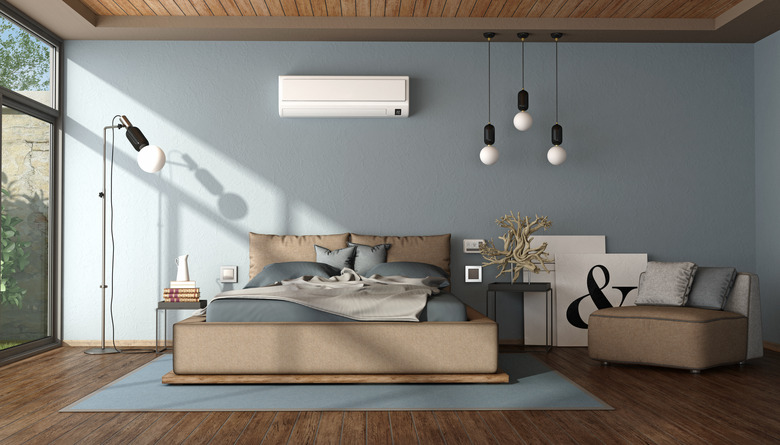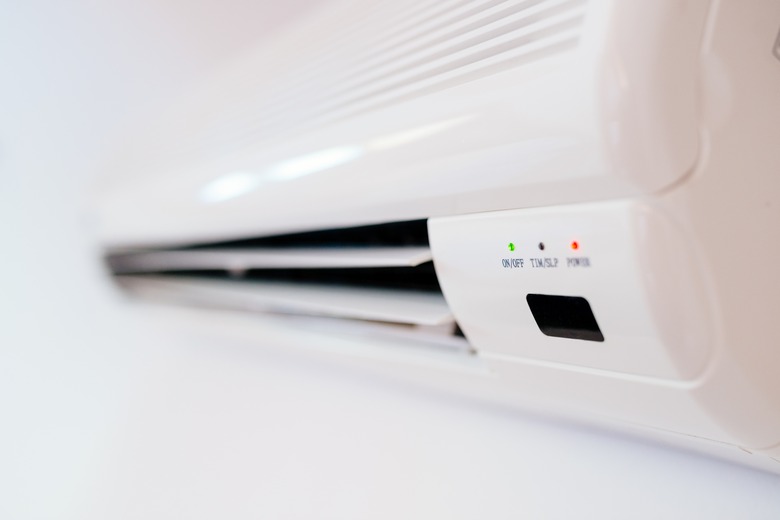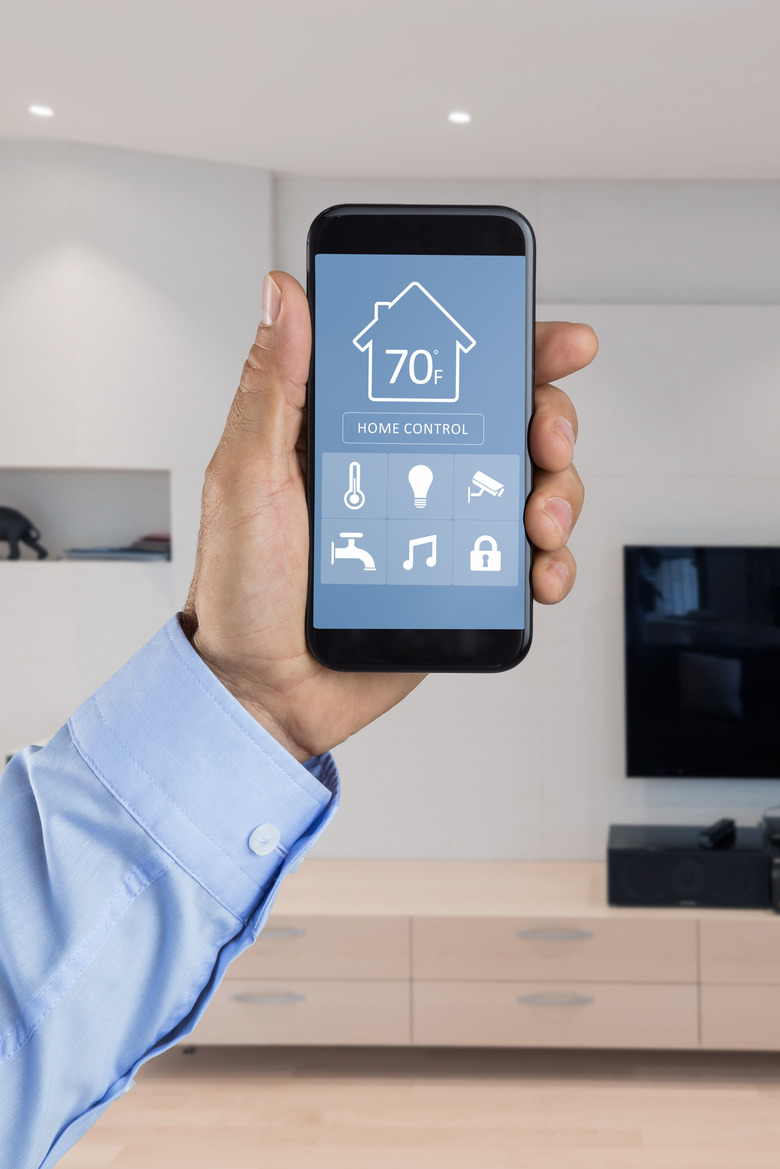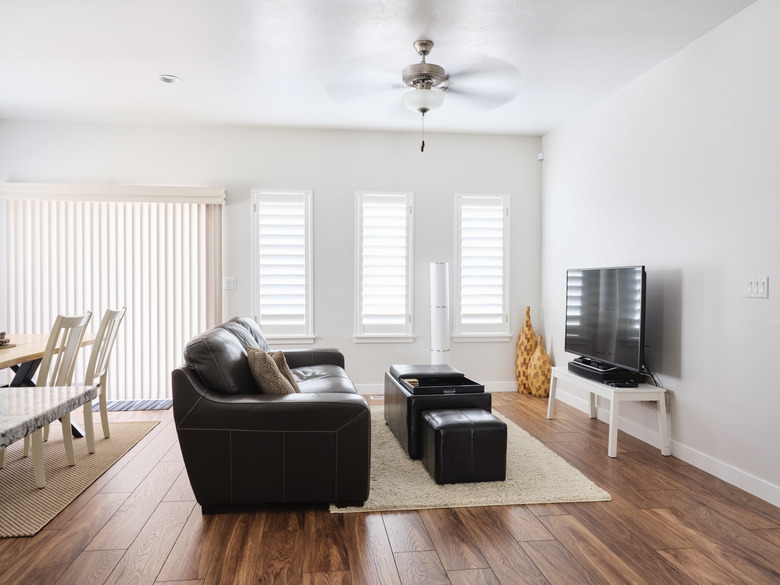How To Save Money On Air Conditioning
Even if you live in a relatively cool climate, there are almost certainly days warm enough to require air conditioning, and any time an air conditioner is running, there are opportunities to cut operating costs through better efficiency. In warmer climates, a constantly running central air conditions can create monthly electricity bills that can run up to $200 per month. That's about as much as an average householder spends for all other electricity needs. In other words, running an air conditioner can double your electricity bill.
You don't have to resign yourself to such a drastic increase in energy costs. If you shop wisely, you can save money in the long run by opting for an energy-efficient unit, although you'll probably have to pay a bit more for one. An efficient unit will save you even more money if you're smart about how you use it and you take steps to avoid wasting the cool air the unit produces. You can also make a few basic improvements to improve air circulation in your home so that the cool air is available where you need it most: on your body.
Consider Efficiency when Shopping for a New AC Unit
Consider Efficiency when Shopping for a New AC Unit
Central air is the ultimate in convenience. You set the temperature at the thermostat and the central air system dutifully sends cold air to every room at the same time. However, considering that a condenser for a central air system draws 3,500 watts—as opposed to 900 to 1,500 watts for an average window unit—central air isn't necessarily the most economical choice. If saving money is a priority, consider installing window units in the rooms that you use the most, and keep the doors to other rooms closed.
Note the SEER: Whether you're shopping for a central air system or a window unit, choose an Energy Star-rated model. It uses an average of 15 percent less electricity than a model without this rating. You should also pay attention to the SEER (Seasonal Energy Efficiency Rating). The higher the rating, the more efficient the machine. The SEER must be at least 13 to pass government inspection, but units with a SEER as high as 23 are available.
Buy the right size: A window air conditioner is rated for a particular room size. Buying a unit that's too large for the room is just a waste of money, but don't undersize, either. If the unit is too small for the space, it will cycle on more often than it needs to, and that also wastes money.
Tip
If you opt for a central system, consider including an AC mister to the system. It sprays a steady mist on the condenser, keeping it cool and increasing its efficiency. Once the condenser is in place, keep the area around it free of grass or other vegetation so it has an unobstructed flow of air.
Use the Air Conditioning Wisely
Use the Air Conditioning Wisely
A common myth has it that you save energy by leaving your system on all day, even when you aren't home. The thinking is that the unit doesn't have to work as hard to maintain a comfortable temperature as it does to cool down a hot room. The reality, however, is that you save in energy costs by using the air conditioner only when you need it. Go ahead and let the house warm up when you aren't home_._ Here are some other usage tips to keep your costs down:
- If you use a thermostat to control a central air system, make sure it's a programmable one. According to the U.S. Department of Energy, you can lower your cooling bill by 10 percent by programming the thermostat to allow the temperature to rise when you're asleep or you're not at home.
- When you need cooling, don't overdo it. Every degree below 78 degrees Fahrenheit costs an additional 3 to 4 percent in energy charges.
- Open up windows at night if the evenings are cool. If outdoor temperatures are falling below the normal indoor temperature at night, take advantage of this by filling your home with that cool outdoor evening air. Once the indoor temperature has fallen, close the windows and trap the cool air. You may be able to delay starting up the air conditioner by several hours the following morning as the home gradually heats up again in daylight.
- Plant shade trees. It can take awhile for this effort to pay dividends, but over the long run, a house shaded by trees will be less expensive to heat.
Tip
If you're installing a new thermostat, place it on an interior wall in the shade. If you put it in a sunny location, it will think the house is hotter than it actually is and run the air conditioning too often.
Reduce Thermal Exchange with the Outside
Reduce Thermal Exchange with the Outside
"Close the doors; don't cool the outside," is a common refrain from budget-conscious heads-of-households, especially in homes with children. It's good advice, but you should go a little farther than simply closing the doors and windows.
- Install weatherstripping on all the doors and windows so that when you close them, they're really sealed. This will also help to lower your heating bills.
- Close the curtains and blinds. Besides keeping out the sun, they provide an extra level of thermal protection.
- Seal cracks in the baseboards and door and window trim to reduce heat exchange with the outside.
Try to limit activities that generate heat, such as cooking and drying clothes, to times of the day when it's cooler outside. Generating heat in the house when the air conditioner is running is guaranteed to raise your cooling costs.
Home Improvements That Can Help
Home Improvements That Can Help
You might go to great pains to hermetically seal your house and still spend more than you need for cooling if your walls and roof absorb heat and radiate it into the living space. To mitigate this, consider painting the outside of the house a light color and installing a reflective roof. Metal roofs are highly reflective, and they last far longer than shingles or other composite materials. An SPF (spray polyurethane foam) roofing system, painted white, is also a great choice.
Inside the house, ceiling fans keep air circulating and redistribute warm air that collects around your body. A ceiling fan also improves the efficiency of your heating system because it recirculates warm air that collects near the ceiling.
Tip
Whether you have a central air system or you window AC units, it's important to clean the filters regularly. If the filters are dirty, the condenser has to work harder and it generates more heat. Your energy bills go up, and the service life of the condenser goes down.



